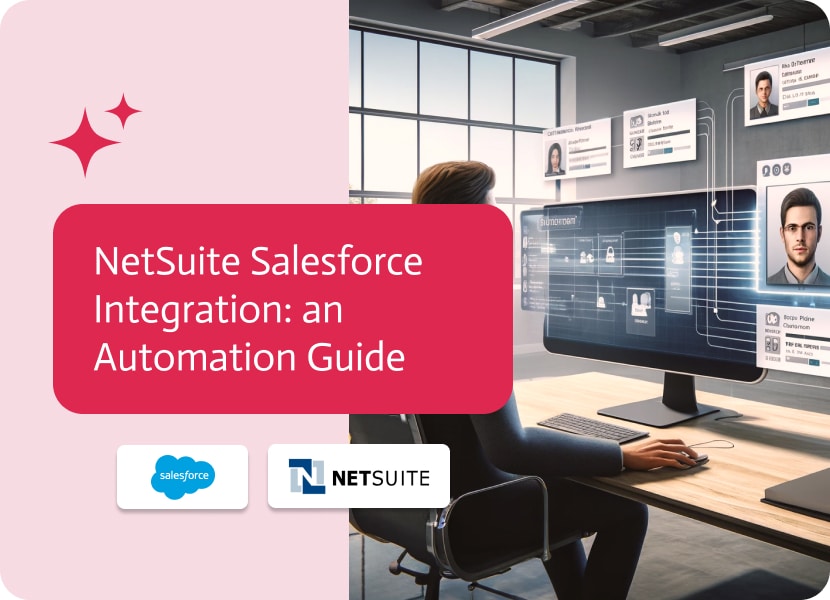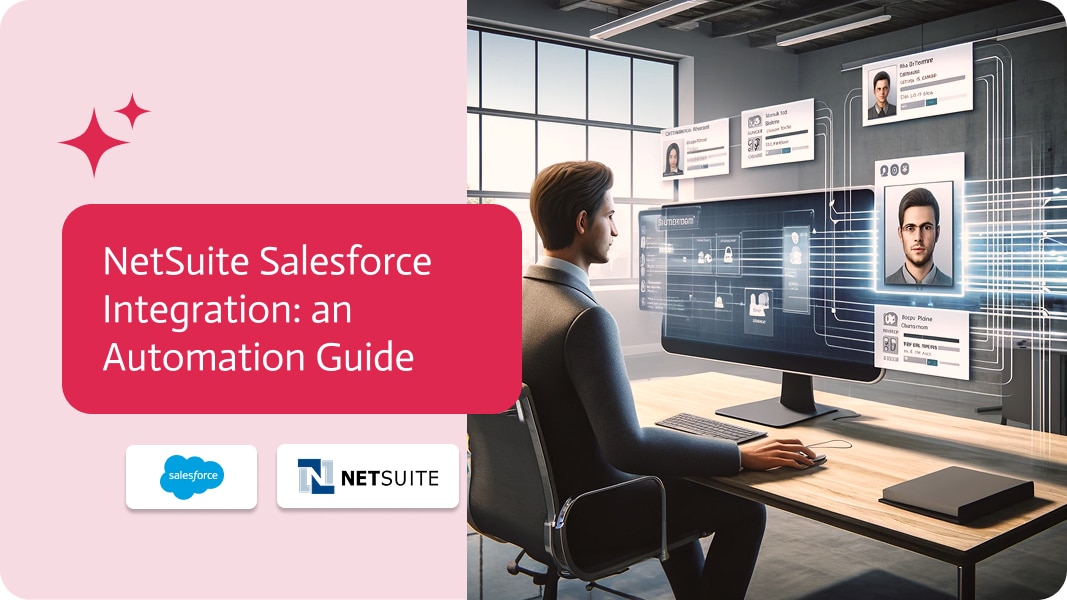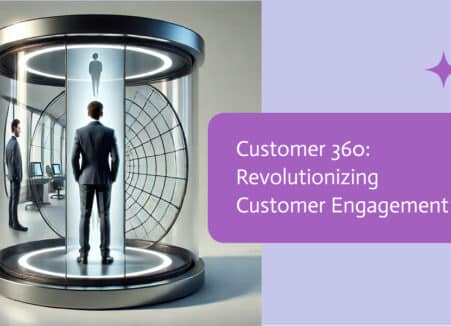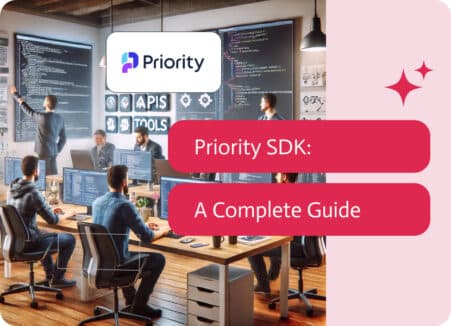

NetSuite Salesforce Integration: an Automation Guide
NetSuite Salesforce Integration refers to the seamless connection between NetSuite, a leading cloud-based Enterprise Resource Planning (ERP) system, and Salesforce, a premier Customer Relationship Management (CRM) platform. This integration is designed to unify business processes by enabling real-time data synchronization between financial and customer data, leading to improved operational efficiency, enhanced decision-making capabilities, and a more holistic view of business performance.
For businesses that rely on both platforms, integrating NetSuite with Salesforce removes the need for manual data entry, reduces errors, and provides a comprehensive 360-degree view of customer interactions, sales history, and financial performance. The automation of key processes, like lead-to-cash, allows businesses to focus on growth, reduce inefficiencies, and leverage better customer insights for revenue-generating opportunities.
Why NetSuite Salesforce Integration Matters
In today’s highly competitive business environment, data silos between financial and customer management systems can significantly slow down operations and create roadblocks to informed decision-making. Without integration, businesses may struggle with inefficient processes, inaccurate financial reporting, and missed revenue opportunities.
With NetSuite Salesforce Integration, companies can bridge the gap between their ERP and CRM systems, streamlining sales and financial workflows. This ensures that sales teams have access to accurate, up-to-date financial information while customer success and finance teams gain valuable insights into customer interactions, enabling more personalized service and faster resolution of customer issues.
Key Benefits of NetSuite Salesforce Integration
1. Real-Time Data Synchronization
One of the most significant advantages of the NetSuite Salesforce integration is real-time data synchronization. Whenever a change occurs in one system, the other is automatically updated. This ensures that both Salesforce and NetSuite are always working with the most up-to-date information, from customer contact details to order history and payment statuses.
For example, if a salesperson creates a new contact in Salesforce, the corresponding contact is automatically created in NetSuite, eliminating the need for manual data entry and reducing the risk of errors. This immediate data flow between platforms ensures that the entire organization has access to consistent, accurate information, whether they’re in sales, finance, or customer support.
2. Fully Automated Lead-to-Cash Process
With the lead-to-cash process fully automated through integration, businesses can accelerate their sales cycle. When a lead is converted into a customer in Salesforce, the integration creates an order directly in NetSuite, along with billing and invoicing information. This automation eliminates repetitive manual work, minimizes human errors, and allows sales teams to focus on nurturing relationships rather than handling administrative tasks.
This automation also improves accuracy and speeds up financial processes, making it easier for companies to track revenue and manage cash flow effectively. Finance teams can also benefit from faster, more accurate forecasting and reporting, helping to optimize cash management and financial planning.
3. Comprehensive Customer View
By integrating NetSuite and Salesforce, companies can create a 360-degree view of their customers. This unified customer profile combines data from both the ERP and CRM systems, including sales transactions, service history, and financial interactions. Sales representatives can view important customer information like payment history, order status, and outstanding invoices directly within Salesforce, allowing for more personalized customer interactions.
This holistic view is particularly beneficial for identifying cross-selling and upselling opportunities. For example, a sales rep can see that a customer has purchased specific products or services in the past and offer related products or higher-tier services, driving additional revenue.
4. Improved Financial Management
With real-time access to financial data from NetSuite within Salesforce, organizations can make better-informed financial decisions. Finance teams gain visibility into sales activities, helping them recognize revenue faster, manage invoices more effectively, and ensure timely payment collection. The integration also improves financial forecasting accuracy, giving businesses the tools they need to proactively address potential cash flow issues.
Moreover, accurate financial data helps businesses optimize their pricing strategies and respond more quickly to market trends or changes in demand.
Common Implementation Challenges and Solutions
While the benefits of NetSuite Salesforce Integration are clear, successful implementation requires careful planning and execution. Here are some of the key challenges that businesses may face during the integration process and how to overcome them:
1. Data Synchronization and Mapping
A common challenge when integrating two powerful systems like NetSuite and Salesforce is data synchronization. Data fields in both systems may differ in format, structure, or naming conventions, making it difficult to ensure consistency.
Solution: Proper data mapping is essential. Integration platforms like Noca AI can help automate and standardize this process. Businesses should also ensure that data fields are mapped correctly and consistently between systems to prevent mismatches or duplication of information.
2. Security and Compliance
With the integration of financial and customer data, ensuring that both systems adhere to security and compliance standards is critical. Companies must safeguard sensitive data and comply with industry regulations like GDPR or HIPAA to avoid data breaches.
Solution: Implementing robust security protocols, including encryption and access controls, is essential. Regular audits and updates to security measures help ensure compliance with the latest regulations, keeping sensitive customer and financial data safe.
3. User Training and Adoption
Even the best integration can fail if users aren’t trained properly. If employees aren’t comfortable using the integrated systems or don’t fully understand how to access the new capabilities, the benefits of the integration may be lost.
Solution: Comprehensive user training is critical for successful integration. Providing hands-on sessions, documentation, and ongoing support helps ensure that all team members understand the new system and can leverage it effectively. Engaging users early in the integration process can also help drive adoption.
Integration Methods: Choosing the Right Solution
When integrating NetSuite and Salesforce, organizations have several options, each suited to different business needs:
1. Middleware Solutions
These solutions acts as a bridge between Salesforce and NetSuite, allowing businesses to integrate the two systems using pre-built connectors. Middleware solutions handle complex data transformation and can support extensive integrations involving custom objects and workflows.
2. Integration Platform as a Service (iPaaS)
An iPaaS solution like Noca AI offers a flexible and scalable approach to integration. These platforms provide pre-built connectors and workflows that simplify the integration process, making them ideal for organizations with limited technical expertise. iPaaS platforms are also more scalable, allowing businesses to add new features or expand the integration as their needs evolve.
3. Custom Integration
For businesses with unique needs, custom integration offers maximum flexibility. This approach involves developing a direct API connection between NetSuite and Salesforce, ensuring that the integration meets specific business requirements. While this option requires significant development effort, it provides the highest level of customization.
Use Cases for NetSuite Salesforce Integration
The benefits of NetSuite Salesforce integration extend across various business functions. Here are a few real-world use cases:
1. Streamlined Quote-to-Cash Process
By automating the flow from quote creation in Salesforce to invoicing in NetSuite, companies can streamline their quote-to-cash process. This reduces the time it takes to turn an opportunity into revenue and minimizes the risk of human error.
2. Real-Time Inventory Updates
Sales teams can access real-time inventory levels from NetSuite within Salesforce, ensuring they only sell products that are in stock. This feature improves customer satisfaction and prevents order fulfillment delays.
3. Enhanced Financial Reporting
The integration allows finance teams to create more accurate and timely financial reports, leveraging data from both Salesforce and NetSuite. This leads to better budgeting, forecasting, and cash flow management.
Q&A: Frequently Asked Questions About NetSuite Salesforce Integration
1. What is NetSuite Salesforce Integration?
NetSuite Salesforce Integration refers to the process of connecting NetSuite’s ERP system with Salesforce’s CRM platform to enable real-time data synchronization, automate workflows, and create a unified platform for managing both financial and customer data.
2. How does NetSuite Salesforce Integration improve business efficiency?
Integrating Salesforce with NetSuite eliminates manual data entry, reduces errors, and provides real-time visibility into sales, customer, and financial data. This leads to streamlined operations and faster decision-making.
3. What are the most common challenges when integrating NetSuite and Salesforce?
Challenges include data synchronization, security and compliance, user adoption, and ensuring data integrity. These can be mitigated with proper planning, security protocols, and comprehensive training.
4. Can NetSuite Salesforce Integration be customized to meet specific business needs?
Yes, custom integration development can be used to tailor the connection between NetSuite and Salesforce to meet unique business requirements, providing maximum flexibility.
5. What are the benefits of using an iPaaS solution for NetSuite Salesforce Integration?
iPaaS solutions provide pre-built connectors, simplified workflows, and scalability, making them ideal for businesses looking for a flexible and efficient integration solution without heavy technical development.
By integrating NetSuite and Salesforce, businesses can break down data silos, improve operational efficiency, and enhance the customer experience, positioning themselves for long-term growth and success.


